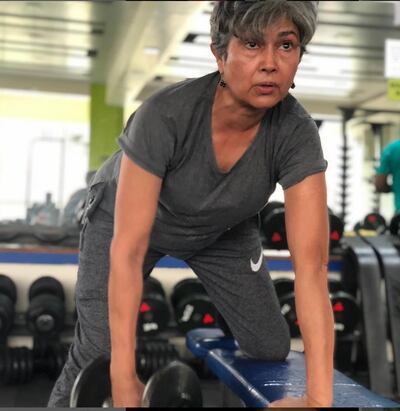Swetha Devaraj is an enthusiastic advocate of strength training for women on social media. However, the fitness instructor would like to see more women working out who are above the age of 50.
“Many think weight training is not for them,” she says. “In fact, it’s the opposite. The older generation, especially those going through menopause or post that, need it even more.”
Make no bones about it
Menopause is a consequence of biological ageing that affects women, primarily in the age range of 45 to 55. According to experts, it can occur earlier because of autoimmune diseases, chromosomal abnormalities or other reasons.
Caused by a decline in oestrogen production, the onset of menopause is considered to be 12 months of uninterrupted menstrual cessation, according to the World Health Organisation. Symptoms range from anxiety and insomnia to hot flushes and palpitations.
Experts say one of the biggest consequences, directly linked to oestrogen deprivation, is osteoporosis. According to myriad studies, women may face up to 20 per cent bone loss during this time.
Devaraj says: “Unfortunately, many women are either in denial of the personal risk bone loss can entail to their mobility and quality of life, or simply are not aware of strategies to mitigate it.”
While genetics and nutrition play a role in preventing osteoporosis, Devaraj and other experts say the value of physical activity cannot be ignored.
orthopaedic surgery consultant
Studies suggest strength training can help increase muscle strength and bone mineral density, as well as enabling better motor control and co-ordination. It is not restricted to lifting weights. Other exercises that improve power and endurance, such as routines that use resistance bands and body weight exercises such as burpees, push-ups and plank, are also recommended.

Dr Shashikiran R, an orthopaedic surgery consultant at Apollo Hospitals in India who specialises in bone and joint care, recommends starting strength training early, before menopause if possible, to build a solid foundation. “Tailoring the intensity and type of exercises to individual levels is essential, so consult with a healthcare or fitness professional,” he says.
“Weight-bearing exercises help maintain and increase bone density, reducing the risk of osteoporosis. Combined with proper nutrition, including adequate calcium and vitamin D, strength training is a proactive approach to improving bone health during menopause.”
Girl talk
Devaraj’s mother complained of joint pain and low energy levels but did not like the idea of going to the gym because she was not comfortable working out around men.
“Convincing her to lift weights was so tough,” says Devaraj. “She thought weight training was for youngsters and that walking twice a day was adequate at her age.
68, competitive weightlifter
“This is a common misconception. I explained to her that many women in their menopausal phase have seen a positive impact on their quality of life, energy levels, metabolism and joint health through strength training.”
Her mother eventually agreed to train twice a week after realising that becoming stronger would prolong her independence.
Devaraj says another common misperception is that lifting weights will make women look bulky or manly. “Women simply don’t have the same amount of testosterone as men, so that’s not possible,” she explains, adding that women with a higher muscle-to-fat ratio can effectively eliminate excess glucose or carbohydrates consumed the night before through weight training.
Working wonders
Experts agree that menopause – and in turn oestrogen deficiency and lowered bone density – is unavoidable. However, strength training can work wonders for some women.
Lorraine More is a case in point. At 68, she is at an age when many take a back seat. But More represented India as a weightlifter when she was 66 and even won gold at a prestigious Asian Classic powerlifting event in 2021.
Being able to represent her country was a bonus. For More, the health benefits are more important. “I started strength training much later in life,” she explains. “It was my son who educated me. I see many women who used to lift weights stop training in their 40s, but that is when they actually need it most.”
More has always lived an active life, taking part in yoga, trekking, playing with her dogs and running an equestrian academy and petting farm in Talegaon, India. She goes to the gym three times a week and still hopes to represent India again at powerlifting events in the future. She has her sights set on masters level for those above the age of 70.
Reminiscing about how tough she used to find it, even when attempting to lift a gas cylinder or move a pot, More declares: “Thanks to strength training, I am fitter in my 60s than in I was in my 30s.”

